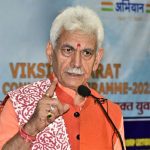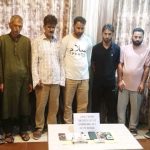Rajouri, Sep 14: Environmental Sciences Programme, Centre for Biodiversity Studies, and Department of Zoology, School of Biosciences and Biotechnology BGSB University, Rajouri celebrated National Hindi Diwas on Thursday with great fervour and enthusiasm. This year’s theme was ‘Hindi Traditional Knowledge to Artificial Intelligence’ to raise awareness of the significance of Hindi in the nation.
Prof Akbar Masood, Vice Chancellor BGSBU, in his message, emphasised that on this day in 1949, it was decided by the Constituent Assembly that Hindi would be the official language of the Central government. To emphasise the importance of Hindi and promote it in every region, every year Indians have observed Hindi Diwas on September 14 since 1953, he said.
During the programme, Mohd Ishaq, Registrar and Hindi Officer, BGSBU, stressed the need to understand that Hindi is not just a means of communication, it is a source of cultural pride and heritage as hundreds of old literature from great authors are available in Hindi, which are the great source of knowledge and wisdom.
“A few of them are already translated to other languages for non-Hindi speaking states. That is why it is said that Hindi connects us to our roots and allows us to express our thoughts, emotions, and aspirations in a language that resonates with millions,” he said, adding, “In order to boost this language, we should celebrate this day every year and should also organise orientation programmes, seminars/essay writing competitions, short stories, etc throughout the year for strengthening this beautiful language.”
Dr A. A. Shah, Associate Dean Academic Affairs stressed the importance of the use of Hindi as India’s official language and the promotion of all Indian languages through literature, theatre and cinema as part of the larger effort to promote India’s rich and diverse cultural heritage.
During the event, an on-spot writing competition was organised in which students and research scholars participated. The first prize was secured by Ms Supriya Sharma, Department of Zoology, while Anushka Bali (Environmental Sciences), and Iram Naz (Department of Zoology) bagged second and third prizes, respectively.
Dr Shreekar Pant, Coordinator, Centre for Biodiversity Studies, welcomed the university officers, staff, students, research scholars and other dignitaries who were present at this function. Dr Pant highlighted the changing face of Hindi in the present scenario and gave a brief description of the history of this language and conducted the proceedings of the programme.
Dr M.A. Hannan Khan, Senior Assistant Professor, Department of Zoology, while delivering the vote of thanks also expressed that by learning this language, one can broaden his or her horizons, improve cognitive skills, and fosters cross-cultural understanding as is also helpful for those, who are pursuing academic interests in fields related to Indian history, literature, or politics.









